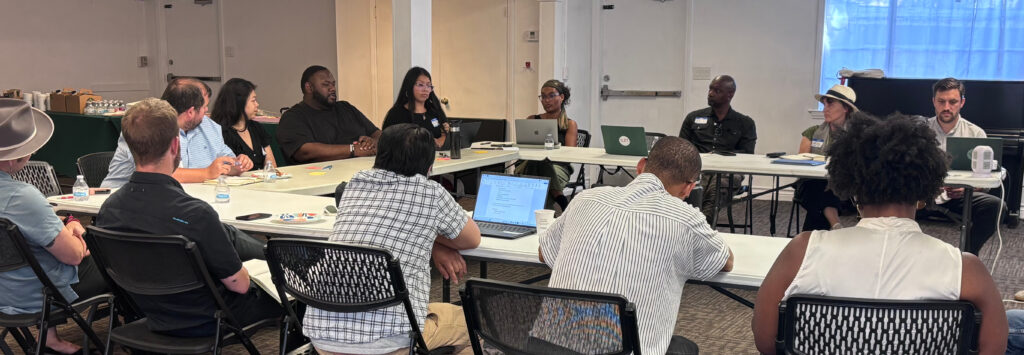On Monday, August 18, a group of nonprofit leaders came together to discuss how they can leverage their expertise to advance collective impact in the Eaton Fire recovery and rebuilding process. The meeting was facilitated by Kounkuey Design Initiatives (KDI), a Los Angeles-based community development and design nonprofit that partners with under-resourced communities to envision and create productive public spaces that address community needs (e.g., infrastructure builds, green spaces, etc.) United Way of Greater Los Angeles organized the meeting, in partnership with KDI, to codify a working group that will focus on devising a “People’s Action Plan” which prioritizes a community-led revisioning to establish vibrant hubs, cultural spaces, and/or income-generating opportunities that support families, individuals, and the broader community impacted by the fires.
Monday was more than just a conceptual strategy meeting, as those who were involved call Altadena home. The primary goal of the initial meeting was to collectively share learnings and create a dedicated space for partnership and planning around long-term recovery efforts for the community of Altadena. This cohort was curated as a holistic development strategy aimed to improve the environmental condition, promote economic activity, maintain and strengthen the social fabric of this vibrant neighborhood. Participants included nonprofit leaders, community members, parents, and neighbors who walk the same streets that are now marked by fire. The participating partners and what they bring to the table include:
Project Passion
Project Passion maintains the vision of a world that thrives through unity, collaboration, and a shared purpose. In their commitment to serving the community, Project Passion offers annual events such as the Community Welcome Back Day, which celebrates Pasadena Unified School District students throughout the school year, or the Young Kings Retreat that provides mentorship to young black and brown men in Northwest Pasadena. Following the Eaton Fire, Project Passion organized a Dena Relief Drive, which provides essential support to those who were affected by the wildfire.
DENA Heals
DENA Heals was a direct outgrowth of the Eaton Fire and serves as a recovery initiative to address the immediate and longer-term mental health needs of those who were affected by fires. It does this by providing a community space for healing, offering scheduled classes in yoga, healing circles, and other activities.
My Tribe Rise
My Tribe Rise’s mission is to create programs that meet the immediate needs of working-class, elderly, and disabled Black residents in Altadena and Pasadena. In the aftermath of the Eaton Fire, My Tribe Rise launched their We Will Rise recovery initiative, which is committed to restoring the lives of those in need with resources and goods such as clothes, hygiene items, meals, and much more.
LA Voice
LA Voice is a multiracial, multifaith organization that believes community, organization, and leadership can help create a more abundant life for those in Los Angeles County. LA Voice is committed to building an equitable and abundant life for those who were affected by the Los Angeles fires through their Benevolence Fund. Funds raised will ensure that recipients receive the resources they need.
Bet Tzedek
Bet Tzedek’s vision is to provide equitable access to justice for all. They provide person-centered legal services that integrate with social support services, educate community members about their legal rights, and use a collective voice to reform systems. Bet Tzedek offers resources for those who were affected by the Los Angeles fires, including information on unemployment insurance, workers’ rights, and much more.
The collective is beginning to imagine how these pieces might take root locally and how their neighbors can not only be recipients of care but also become collaborators in the rebuilding process. The work is just beginning, but Monday’s gathering shows that collaboration, not isolation, is the path forward.
One of the resources that can be utilized today is the Wildfire Recovery Resource Hub, which curates emergency response services, housing support, mental health, and mutual aid programs for individuals impacted by the wildfire. This resource hub is also only the beginning of United Way’s efforts to expand and cultivate a resource hub where organizations on the ground have a centralized place to offer services and a place where those searching can find them.
